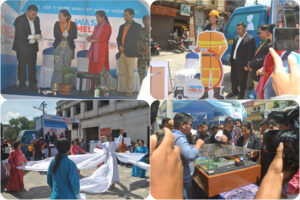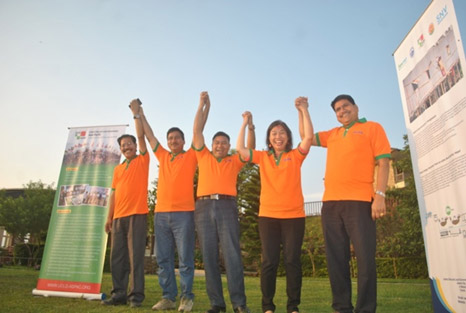8 – 9 June 2019 | KATHMANDU – UCLG ASPAC’s mission to promote better sanitation management in Nepal continues to gain national support, with the recent pledge signed by Minister for Water Supply, H.E. Bina Magar, to work on faecal sludge management (FSM). The pledge was announced during WASH (Water, Sanitation and Hygiene) Mela 2019 held in Kathmandu on 8-9 June 2019 to mark the World Environment Day and 20th National Sanitation Week. The event also coincided with the local festival of Sithi Nakha that marks the start of the monsoon by cleaning water resources in Nepal.
A similar pledge was previously signed by Nepal’s Prime Minister, H.E. K. P. Sharma Oli, on 13 March 2019 under “Municipalities Network Policy Advocacy on Sanitation in South Asia” project. The initiative has been implemented by UCLG ASPAC in Bangladesh and Nepal. WASH Mela 2019 was organised by UCLG ASPAC’s implementing partner, Municipal Association of Nepal (MuAN) and technical partner, Environment and Public Health Organisation (ENPHO) – both in Nepal.
Speaking during the event’s inauguration, Minister Bina Magar expressed that “The WASH Mela is such a unique initiation. This should be a yearly event. As a direct line-minister related to faecal sludge management, this is the first time that I have signed such a pledge.”
To symbolise the inauguration, Minister Bina Magar added faecal sludge compost and watered a plant with human urine manure. She also visited different stalls and appreciated the demonstration on faecal sludge management practices by project team members from UCLG ASPAC, MuAN and ENPHO.
“WASH Mela is a wonderful platform for us to advocate the importance of this work during this big gathering comprising of general public, government officials, academicians and non-governmental organisations who are passionately working in the field. This is indeed the first event of its kind that MuAN has hosted,” said MuAN President and Dhulikhel Mayor Mr. Ashok Kumar Byanju Shrestha.
The partnership in this event came about on 30 May 2019 when the National Sanitation and Hygiene Committee (NSHCC) comprising all major organisations under Department of Water Supply and Sanitation (under Nepal’s Ministry of Water Supply) invited UCLG ASPAC’s implementing partner MuAN to join the Committee and endorsed WASH Mela 2019 as a national event with the slogan “Federal, Provincial and Local Government: Total Sanitation for Prosperous Development.”
The event was organised near downtown Kathmandu, at the entrance of Basantapur in Kathmandu Durbar Square (a World Heritage site) and visited by over 8,000 visitors. More than 26 organisations (government, non-governmental and private) working in water and sanitation showcased their work along with side events such as street dramas and panel discussions on various theme related topics, primarily on faecal sludge management.

People remember superheroes for their legacy
CWIS Workshop in Nepal

Meanwhile in another event in Nepal from 12-15 June 2019, a training on City-Wide Inclusive Sanitation (CWIS) was conducted for all 10 pilot municipalities from Bangladesh and Nepal under “Municipalities Network Policy Advocacy on Sanitation in South Asia” project. UCLG ASPAC Secretary General Dr. Bernadia Irawati Tjandradewi attended the inaugural session and expressed her full support to the project and encouraged the officials to complete the project successfully.
“You (Mayors and officials) are in an important position to bring about positive changes. People will remember you for your legacy,” said Dr. Bernadia Irawati Tjandradewi during the inaugural session at Rupakot, Nepal, attended by five Mayors from Nepal and Sanitation Focal Persons from all ten pilot municipalities. She further added that “The Mayors are very busy people but with the work that they perform in local governance, they are like superheroes. Everything can be done with strong commitment and determination of leaders.”
Apart from the importance of managing faecal sludge in the municipality’s sanitation plan, the participants learned about the linkages of CWIS seven principles. The training also deepened their understanding of and analysis on technical aspects of a shit-flow diagram and how to consider sanitation in the yearly plan of municipalities. The Project Team visited Waling Municipality (one of the five pilot municipalities in Nepal) and returned to the capital Kathmandu to visit the faecal sludge treatment plant in Lubhu of Mahalaxmi Municipality in Nepal.











